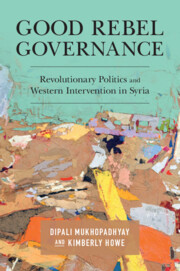Book contents
- Good Rebel Governance
- Good Rebel Governance
- Copyright page
- Contents
- Figures
- Acknowledgments
- 1 Introduction
- 2 The “Good Governance Bazaar”
- 3 Reconceptualizing Rebel Governing Authority
- 4 Studying Syria “from the Verandah”
- 5 Raqqa’s Caliphal Social Contract
- 6 Saraqeb’s “Limited Access Order”
- 7 The Fervent Enclave of Darayya
- 8 Aleppo’s Republican Guild
- 9 The Syrian Interim Government as “Floating” Counter-State
- 10 Revolutionary Possibilities and International Imaginings
- Notes
- Select Bibliography
- Index
2 - The “Good Governance Bazaar”
Published online by Cambridge University Press: 01 June 2023
- Good Rebel Governance
- Good Rebel Governance
- Copyright page
- Contents
- Figures
- Acknowledgments
- 1 Introduction
- 2 The “Good Governance Bazaar”
- 3 Reconceptualizing Rebel Governing Authority
- 4 Studying Syria “from the Verandah”
- 5 Raqqa’s Caliphal Social Contract
- 6 Saraqeb’s “Limited Access Order”
- 7 The Fervent Enclave of Darayya
- 8 Aleppo’s Republican Guild
- 9 The Syrian Interim Government as “Floating” Counter-State
- 10 Revolutionary Possibilities and International Imaginings
- Notes
- Select Bibliography
- Index
Summary
After 2011, the Syrian opposition took on the Assad government directly through military means and indirectly by establishing pockets of rule beyond the government’s reach. As rebels took control of many government-held locations, they sparked the establishment of insurgent governing institutions in hundreds of communities. Local opposition-run institutions in the form of civilian-led local councils proliferated, dotting the provinces of Aleppo, Idlib, rural Damascus, Raqqa, Hama, and Homs. They worked to deliver basic relief and restore public services, sometimes in collaboration with, but often operating separately from, their armed counterparts. The boundaries of this “political marketplace”1 grew increasingly porous as a number of foreign states and private actors directly championed clients of their choosing, bolstering their favorites with financial and military support.2
Keywords
- Type
- Chapter
- Information
- Good Rebel GovernanceRevolutionary Politics and Western Intervention in Syria, pp. 18 - 32Publisher: Cambridge University PressPrint publication year: 2023

